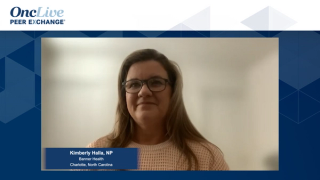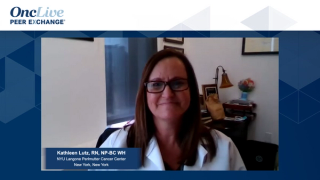
Endometrial Cancer
Latest News
Latest Videos

More News

Durvalumab plus first-line chemotherapy, followed by maintenance treatment with durvalumab plus olaparib, emerges as a potentially effective combination for patients with limited treatment options.

The FDA has approved dostarlimab plus chemotherapy for patients with primary advanced or recurrent endometrial cancer that is mismatch repair deficient, as determined by an FDA-approved test, or microsatellite instability-high.

Patients with TP53 wild-type endometrial cancer experienced a median progression-free survival of 27.4 months vs 5.2 months with placebo.

An analysis of patient-reported outcomes in the phase 3 RUBY trial supports dostarlimab use in patients with primary advanced or recurrent endometrial cancer.

The United Kingdom’s National Institute for Health and Care Excellence has updated their guidelines to recommend pembrolizumab plus lenvatinib for patients with previously treated endometrial cancer.

Pembrolizumab inspired a 70% risk reduction in women with mismatch repair–deficient advanced endometrial cancer and a 46% risk reduction in patients with mismatch repair–proficient disease.

Dostarlimab met its primary end point in the phase 3 RUBY trial by increasing the 2-year progression-free survival rate to 36.1%, compared with 18.1% with placebo.

Oncology nurse experts review their experiences with newcomers for the treatment of advanced endometrial cancer and exchange best practices in caring for this population.

In the all-comer population, the overall response rate was 33.8%, including a complete response rate of 7.5% and a partial response rate of 26.3%.

The gynecological cancer lymphedema questionnaire and the lower extremity lymphedema screening questionnaire showed a demonstrable correlation in total scores, according to an analysis of women with advanced endometrial cancer.

Courtney R. Arn, APRN-CNP, discusses the recent approval of dostarlimab for patients with mismatch repair–deficient recurrent or advanced endometrial cancer.

Updated findings from the KEYNOTE-146 trial support the use of lenvatinib/pembrolizumab in advanced endometrial cancer.

Dostarlimab-gxly has been granted regular approval for the treatment of patients with dMMR endometrial cancer. The label comes with warnings for immune-mediated adverse effects.

Closing their discussion, the panel shares advice for new nurse practitioners caring for patients who have endometrial cancer.

The panel shares the most critical unmet needs for patients with endometrial cancer.
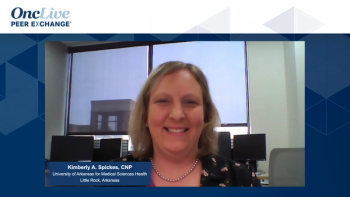
Kimberly A. Spickes, CNP, discusses how often patients with endometrial cancer have dose reductions or interruptions at her institution, and who is involved in the decision to dose-reduce.
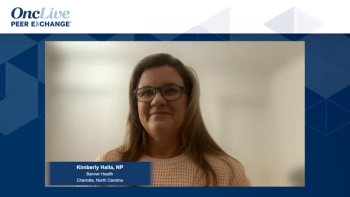
Nurse Practitioner Kimberly Halla explains the proactive measures she takes to ensure patients with endometrial cancer are prepared to experience and manage the adverse effects of treatment.

Kimberly A. Spickes, CNP, details the adverse events she sees with combination lenvatinib and pembrolizumab treatment for recurrent endometrial cancer.

Kimberly Halla, NP, describes the standards for monitoring patients on therapy for recurrent endometrial cancer, including how often patients are seen in-person.

The panel explains how to educate patients on the adverse effects they may experience with chemotherapy, their options for management, and the importance of encouraging patients to contact their care team.

The panel reviews the second-line treatment options for patients with recurrent endometrial cancer.
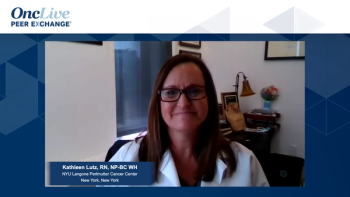
Nurse Practitioner Kathleen Lutz talks about the efficacy of chemotherapy in patients with endometrial cancer, and how she discusses the chance of disease recurrence with patients.

Continuing her discussion, Kathleen highlights the most common adverse events she sees in patients treated with chemotherapy for advanced endometrial cancer who are unfit for surgery.

Lenvatinib is approved in combination with pembrolizumab for the treatment of patients with advanced endometrial cancer who have disease progression after systemic therapy, are not candidates for curative surgery or radiation, and who are mismatch repair proficient or not microsatellite instability–high.

Dostarlimab plus standard-of-care chemotherapy, followed by dostarlimab alone, met a predetermined progression-free survival end point in the phase 3 RUBY trial.








